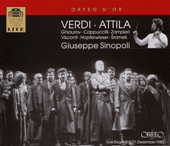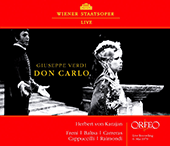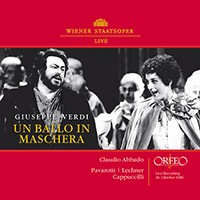Piero Cappuccilli
Piero Cappuccilli was born into a naval and opera-loving family, from whom he inherited a love of the sea and of underwater swimming but not, initially, an interest in singing. However, encouraged by his family, he auditioned in 1949 at the local opera house where a retired singer, Luciano Donnaggio, was beginning a second career as a teacher. Despite Donnaggio’s enthusiasm, Cappuccilli still felt that a future career as an architect seemed more promising and it was only the offer of free lessons that persuaded him to study seriously from 1950. With Donnaggio he worked on applying his extraordinary breath control, developed while swimming, to singing, and in particular to sustaining a phrase and developing the technique of messa di voce.
In 1955 Cappuccilli auditioned for La Scala, Milan and the panel, extremely impressed, urged him to enter the Viotti Singing Competition. After winning the first prize, he was engaged by the Teatro Nuovo, Milan, to appear as Tonio/Pagliacci in 1957. The following year he sang Montfort/I vespri siciliani at Palermo under Tullio Serafin, who invited him to take the part of Enrico in his forthcoming stereo recording of Lucia di Lammermoor with Maria Callas for EMI’s Columbia label. The producer, Walter Legge, subsequently cast him as Masetto in his celebrated recording of Don Giovanni under Carlo Maria Giulini.
While developing his career throughout Italy Cappuccilli was invited by the Metropolitan Opera to appear as Germont père in a single performance of La traviata in March 1960, as a ‘try-out’. Later invitations from the Met, after he had established himself as a major international singer, failed to stimulate his interest. His début at La Scala was in 1964 as Enrico, followed by Amonasro/Aida, and Posa/Don Carlo; he remained one of this theatre’s key singers for the next twenty-five years. Cappuccilli appeared at the Verona Arena for the first time in 1966 in the title rôle in Rigoletto and, as at La Scala, was to be a welcome guest there for the rest of his career.
Cappuccilli was fastidious in his choice of work, as his relationship with Covent Garden well demonstrates. He first appeared there as Germont père in Luchino Visconti’s new production of La traviata in 1967, only returning in 1975 to sing Renato in another new production, by Otto Schenk, of Un ballo in maschera, conducted by Claudio Abbado. He made his début with the Chicago Opera, to which he frequently returned, in 1969 as Riccardo/I puritani, and appeared at the Paris Opera for the first time in 1973 as di Luna/Il trovatore.
Now Cappuccilli really hit his stride, with legendary interpretations at La Scala of the title rôle in Macbeth, directed by Giorgio Strehler and conducted by Abbado (1975), and of Iago in the centenary production of Otello conducted by Carlos Kleiber (1976). He enjoyed particular success in the title rôle of Simon Boccanegra, a part he very much made his own in the legendary 1976 La Scala production by Strehler. Between 1975 and 1985 he appeared at the Salzburg Festival at the invitation of Herbert von Karajan as Posa (1975–1978), Amonasro (1979–1980) and Macbeth (1984–1985).
Established as one of the leading baritones of the latter half of the century, Cappuccilli was active as a guest throughout Italy, Germany, Spain and Austria, appearing many times at the Vienna State Opera. His repertoire extended to more than fifty major parts, of which sixteen were in operas by Verdi. His final appearance at La Scala was as Scarpia/Tosca in 1989, the year in which he appeared at Covent Garden singing the major baritone rôles in both Cavalleria rusticana and Pagliacci. He continued to sing leading rôles at the Verona Arena, such as Nabucco, until a motoring accident after a performance there ended his career in 1992.
On stage Cappuccilli exuded a quiet authority that could be highly effective. His singing style was extremely aristocratic, as may be heard in his numerous live and studio recordings. His voice was remarkably smooth: he phrased effortlessly, with a beautiful tone and very wide range. Offstage he was always calm, affable and courteous, presenting the very best side of the art of the true Italian opera singer.
© Naxos Rights International Ltd. — David Patmore (A–Z of Singers, Naxos 8.558097-100).



















